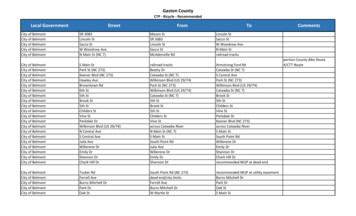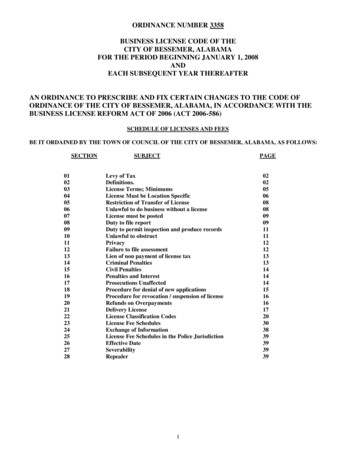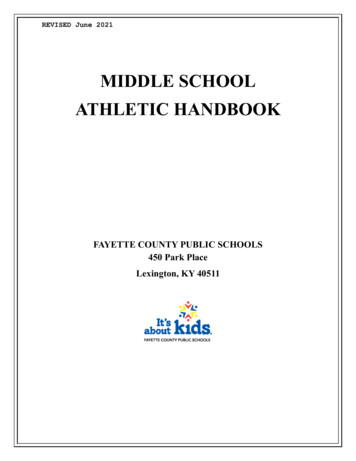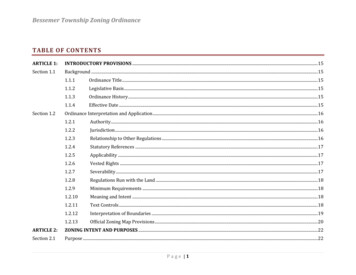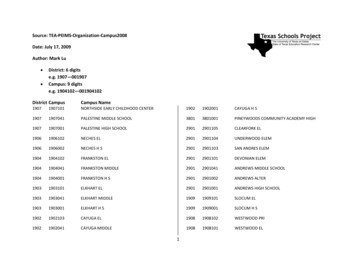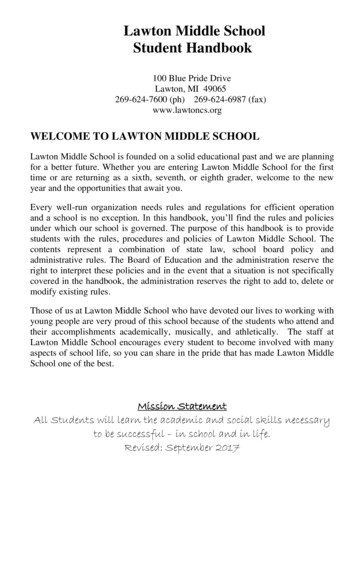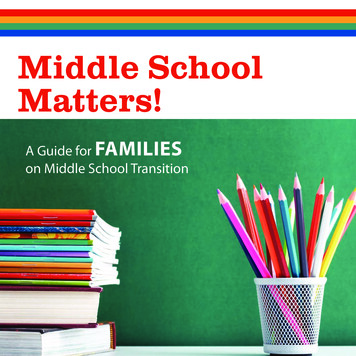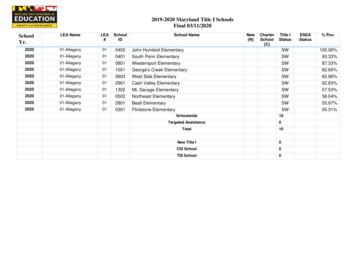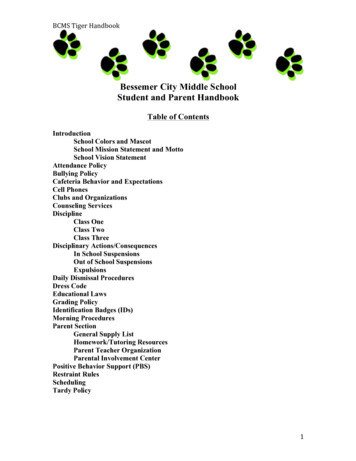
Transcription
BCMSTigerHandbookBessemer City Middle SchoolStudent and Parent HandbookTable of ContentsIntroductionSchool Colors and MascotSchool Mission Statement and MottoSchool Vision StatementAttendance PolicyBullying PolicyCafeteria Behavior and ExpectationsCell PhonesClubs and OrganizationsCounseling ServicesDisciplineClass OneClass TwoClass ThreeDisciplinary Actions/ConsequencesIn School SuspensionsOut of School SuspensionsExpulsionsDaily Dismissal ProceduresDress CodeEducational LawsGrading PolicyIdentification Badges (IDs)Morning ProceduresParent SectionGeneral Supply ListHomework/Tutoring ResourcesParent Teacher OrganizationParental Involvement CenterPositive Behavior Support (PBS)Restraint RulesSchedulingTardy Policy1
BCMSTigerHandbookIntroductionSchool ColorsThe official school colors are purple and white.School MascotThe Bessemer City Middle School Mascot is the tiger.Bessemer City Middle School’s Mission StatementBessemer City Middle School’s Mission Statement is to produce anddevelop responsible and diverse individuals who will contribute positively tosociety.Bessemer City Middle School’s MottoOur school motto is “A student today, a leader tomorrow.”Bessemer City School’s Vision StatementBessemer City Middle School envisions a clean and secure learningenvironment that promotes self-motivated responsible students who valuediversity.AttendanceCompulsory Attendance AgesEvery child residing in the area served by the Bessemer City School System between theages of seven (70) and sixteen (16) year as shall be required to attend school for the entirelength of the school term in every scholastic year. Every student must attend the entirelength of teach school term through the day preceding the sixteenth (16th) birthday. If astudent under sixteen (16) years of age becomes truant, the parent or guardian or saidstudent may be guilty of a misdemeanor and subject to punishment by law, unless theparent or guardian files a written statement in court that he or she is unable to control thestudent.Source:Absences and Excuses/ Excused AbsencesAll student absences shall be designated as either excused or unexcused. A student shallbe excused from school for the following reasons:2
BCMSTigerHandbook1. Illness.2. Inclement weather which would be dangerous to life or health of the student ifshe/he attended school.3. Legal quarantine.4. Death in the immediate family.5. Emergency conditions as determined by the Superintendent or Principal.6. Absence with the permission of the teacher or principal and consent of the parent’provided however that such request shall be required prior to the date of theabsence.Unexcused AbsencesAbsence for reasons other than those defined above shall be considered as unexcused.ExcusesIn accordance with state law, a parent or guardian must explain the cause of everyabsence of students under his/her control or charge. Every student, upon return to school,must bring a written excuse within 3 days from home signed by the student’s parent orguardian for each absence and present it to the principal or his/her designatedrepresentative.The principal or designee shall ensure that the student’s teacher[s] are notified whetherthe absence is excused or unexcused. All written excuses shall be retained of theremainder of the school year in the principal’s office or other approved locations.Make-up Work – Excused AbsencesIf a student is absent for any excused reason as defined above, the student shall beallowed to make up schoolwork and/or examinations missed during said absence orabsences. The student shall be responsible for contacting the teacher/s to arrange formake up work. Said student shall contact the teacher or teachers immediately upon returnto school to arrange a time within a two [2] week period to make up work and/orexaminations . Teachers shall not be required to reteach lessons , but students shall begiven a reasonable opportunity to learn missed due to excused absences.Make-up Work – Unexcused AbsencesTeachers shall not provide make-up work or examinations for students for unexcusedreasons.Excessive AbsencesStudents with unexcused absences of more than ten [10] class sessions per semestercourse of twenty [20] class session per year must present their justification for suchabsences to an appeals committee composed of the students’ teacher[s] and principal toreceive credit for course work. Days when students are absent from school due to official3
BCMSTigerHandbooksuspension/expulsion shall not be counted as a part of the ten [10] class session persemester.Each student who has exceeded the limited for absences will be afforded due to processas follows:1. A committee composed of the student’s teachers and counselor will review allcircumstances associated with his/her attendance record.2. The student and his/her parents may meet with the review committee and presentinformation for consideration of exemption from excessive absences due tomitigating circumstances.3. The review committee may assign full credit, deny credit, or require attendance insummer school based on a fair, impartial, and objective review of the facts of eachcase.School Participation AbsencesStudents who are away from school because of participation in official school-sponsoredactivities shall be marked present and allowed to make up missed work.Religious AbsencesA student will be excused for religious holidays when the student’s parent or guardiancomes in person to the school and signs a request for the student to be absent for thispurpose. When this procedure is followed, the student’s absences will be excused andshall not be counted toward the excessive absence clause of this policy. Students shall beallowed to make up work missed during such absences.Source:Check-in and Check-out RulesA parent or guardian must sign a child in when he /she arrives late and must sign him/herout when there is an early check-out. Parents are encouraged to make medical and dentalappointments for students either after school hours or on those days when school is not insession. Parents must sign students in after 8:00 a.m. After five [5] times beingchecked-in, a parent must meet with the principal to determine a course of action toprevent tardiness.*Drop-off and Pick-up of studentsA student must be dropped off and picked up in designated areas only.-Bus : Drop off and pick up is in the back of the school.- Car Pool: Morning drop off is at the side entrance of the school.4
BCMSTigerHandbookAfternoon pick-up area is in front of building. Car riders will be individually called forand released from the library.Cafeteria ProceduresThe school cafeteria is maintained as a vital part of the health program at Bessemer CityMiddle School. Students are asked to go quietly and quickly to the cafeteria at theassigned time. The following rules relate to the orderly operation of the cafeteria:1. Enter the cafeteria only during the assigned period.2. Stay in the cafeteria during the entire period.3. Return all trays and utensils to the dishwashing area.4. Leave the table and floor around the table clean.5. Deposit all litter in the wastebaskets.6. Take no food or drink from the cafeteria.7. Maintain a moderate level of conversation.8. Adhere to the school rules of conduct.9. Remain seated-no running or walking around10. A student may be prohibited from eating in the cafeteria if inappropriatebehavior is a continuing problem.To assist in keeping our cafeteria clean each student will be expected to assist in wipingtables and picking up the area where his/her class was seated. All students workingtogether will help us to keep the cafeteria clean for the next group of students who cometo eat.Cell PhonesCell Phones/Telephone Use/ Disruptions During the School DayOne of the goals of Bessemer City Middle School is to encourage the maximum use ofeducational pursuits. Classroom instruction will not be interrupted to have students calledout of class to receive telephone calls or messages. Emergency calls (hospital or death)will be verified by the administrator. Cell Phones should be turned into the Main Officeby 8:00 AM. The phones will be returned to the student t 2:50 each day when the studentcomes to the office. If the student keeps the phone and they are caught with the phone inuse in the class or the hall, the phone will be taken up and turned into the office. Theparent will have to pick up the phone and sign for it in the Main Office. After the secondoffense, the student can not bring the cell phone to school without going through thesuperintendent’s office and may be subject to suspension.Alabama State Department of Education Policy5
BCMSTigerHandbookUse of Digital Device During the Administration of a Secure TestStudent PolicyThe possession of a digital device (including but not limited to cell phones. MP3 players,cameras, or other telecommunication devices capable of capturing or relayinginformation) is strictly prohibited during the administration of a secure test. If a student isobserved in possession of a digital device during the administration of a secure test thedevice will be confiscated.If the student is observed using a digital device during the administration of a secure test,testing for the student will cease, the device will be confiscated and is the subject to thesearch, the student will be dismissed from testing, and the student’s test will beinvalidated.Local education agency (LEA) personnel will make all students, parents, and/orguardians aware of this prohibition through inclusion of this policy in the Student Codeof Conduct Handbook and other regularly used modes od communication.DISCIPLINARY ACTIONS FOR CLASS I VIOLATIONSClubs and OrganizationsBessemer City Middle School offers a variety of clubs and organizations.Some of them include:Tiger EliteTiger AmbassadorsBCMS Poetry ClubPINK Mentoring ProgramFirst PriorityNational Junior Honor SocietyBeta ClubSpanish ClubTechnology Student AssociationVolleyball TeamFootball TeamBaseball TeamBandChoir6
BCMSTigerHandbookDaily Dismissal ProceduresWhen students are dismissed in the afternoon, first load or early bus ridersreport directly to their buses. Second load or late bus riders report to thelunchroom. Car riders report to the library. Please note: Parents areexpected to pick up students in a timely manner. The school is no longerresponsible for students after 3:15 pm.DisciplineStudent ConductAll students of the School System are charged with the responsibility to conductthemselves in a manner appropriate to good citizenship everywhere. Student conductshall be founded on the basic concept of respect and consideration for the rights of others.Students in the Bessemer schools shall conform to the rules and regulations of the BoardOf Education, the Superintendent of Schools and the school principal. Students may beheld responsible for their conduct to and from school if it affects school organization orprograms. Source: Policy JCD The rules contained in the Student Code of Conductapplies to all ages. It is reasonable to assume that an increase in age and maturity impliesgreater responsibility for their actions. It is recognized that differences in age andmaturity in age and maturity require various levels of disciplinary implementation;however, these general rules and regulations shall apply to all students in Grades K-12.Source:Classification of Student Code of ConductViolations of the Code of Student Conduct are categorized into three classes:Minor(Class 1), Intermediate(Class 2) and Manor(Class 3) and are applicable to all K-12students of Bessemer City Schools. Prior to determining the classification of a violation,the principal/designee will implement the disciplinary procedure, including allowing thestudent to give his/her explanation regarding the alleged violation prior to deciding theclassification of a violation. The principal/designee may confer with additional parties ifnecessary, before deciding the classification of the violation and the appropriateconsequences for misbehavior.No student shall be punished for any suspected violation until the person responsible forimposing discipline has heard the student’s explanation or made reasonable efforts toprovide the student with an opportunity to present his/her explanation.Each classroom teacher will correct general classroom disruptions by taking in-classdisciplinary action, telephoning the parent/guardian, scheduling school conferences andother management techniques that are appropriate for the behavior. When the action7
BCMSTigerHandbooktaken by the teacher is ineffective or the disruption is severe, the student should bereferred to the principal/designee. Failure to bring school supplies or homework orcomplete class assignments are not cause for disciplinary referrals. When studentsconsistently exhibit poor work habits, the parents/guardians should be notifiedimmediately by the school official and students should be referred to a guidancecounselor.Under no circumstances should academic grades be used for maintaining order in theclassroom nor should student behavior be included in calculating academic grades. Anacademic grade should reflect the teacher’s most objective assessment of the student’sacademic achievement.The principal shall make an immediate effort (same day) to contact the student’sparents/guardians about the suspension. No suspended student shall be allowed to leavethe school premises during the day until the student’s parent/guardian or proper schoolauthorities assume responsibility for his/her. When a student’s parent/guardian ordesignated individual(s) cannot be notified, the student must remain on the schoolpremises until the end of the school day. At the end of the school day, the student willreturn home via normal transportation methods.School employees may always file criminal complaints against wrongdoers.Source:Class 1- Minor Offenses Excessive Distraction of Other Students- Any conduct and/or behavior which isdisruptive to the orderly educational process in the classroom or any other student(e.g., excessive talking, interrupting class, provoking. Gambling- Participation in games of chance for minor sums of money and/orother things of value. Intentionally proving false information to a school system employee, includingbut not limited to, student information data and the concealment of informationdirectly to school business. Possession of nuisance items defined by the principal/designee (e.g., toys, fakeitems such as snakes, spiders, etc.) Cheating or copying the work of other students. Use of obscene manifestations (verbal, written, or gesture) Nonconformity to the dress code Inappropriate public display of affection, including but not limited to, embracingand kissing. Unauthorized absence/tardiness from class or classes. Unauthorized use of school or personal property8
BCMSTigerHandbook Any other violation that the principal/designee may reasonably deem to fallwithin this category.Disciplinary Actions for Class I ViolationsGRADES K-12First Offense: Administrator and student conference. Circumstances may warrantdisciplinary action as outlined under subsequent offenses.Subsequent Offenses: In-school disciplinary action such as probation, detention,academic research related to offense, work assignments before or after school, SaturdaySchool, and supervised in-school suspension. After the implementation anddocumentation of interventions, suspension may be imposed for a maximum of two (2)school days at the discretion of the principal/designee. If these disciplinary actions are noteffective, the principal/designee may seek additional support from central office staffmembers.Disciplinary Actions for Exceptional Students for Class I OffensesThe principal/designee should consult with the special education teacher regardingeffective discipline procedures when a special education student commits a Class Ioffense. If these actions are not effective, the principal/designee should initiateprocedures to have the student’s Individualized Educational Plan (IEP) Committeeaddress the behavior. The IEP Committee will decide if the offense was related to thearea of disability and will decide the appropriate actions to be taken as well as considerthe need for functional behavior assessment and a behavior intervention plan.All revisions to the student’s IEP must be documented within the current IEP. If thedisciplinary actions decided by the IEP Committee are still not effective, theprincipal/designee may refer the student to the director of Special Education or the IEPsupervisor for further action. However, in no instance may a referral to the director ofSpecial Education or the IEP supervisor result in the exclusion from school of a specialeducation student for more than ten (10) cumulative days for the school year which areallowable by law or state regulations. Only the IEP Committee may change a specialeducation student’s placement.Consideration must also be given to the protection and rights afforded to 504 studentsunder both federal and state law.CLASS I OFFENSES MAY NOT BE APPEALED BEYOND THE LOCAL SCHOOLLEVEL.9
BCMSTigerHandbookCLASS II-INTERMEDIATE OFFENSES Defiance of School System Employee’s Authority-Any verbal or nonverbalrefusal to comply with a lawful direction or order of a school system employee.Bringing a water gun to school.Vandalism-Intentionally doing some act that results in injury or damaging by anymeans real, public, or personal property belonging to another.Battery upon Students- Actually and intentionally touching or striking anotherstudent against the will of the other.Trespassing – Willfully entering or remaining in any structure, conveyance, orproperty without being authorized.Stealing, Larceny, Petty Theft – The intentional unlawful taking and carryingaway of personal property value at less 100 belonging to or in the lawfulpossession or custody of another.Extortion, Threats, and/or Intimidation – Verbally, non-verbally, or by a writtenor printed communication maliciously threatening an injury to a person, propertyor reputation of another with the intent to extort money or any pecuniaryadvantage at all or with intent to compel the person so threatened, or any otherperson, to do any act or refrain from doing any act against his/her will.Offensive touching of another person with sexual connotations, such as patting,pinching, or brushing against another’s body.Possession of stolen property with the knowledge that it is stolen and receivingand/or concealing stolen property.Leaving class or campus without permissionDirecting obscene or profane language to a school system employee.Minor disruption on a school bus.Any other violation that the principal/designee may reasonably deem to fallwithin the category.DISCIPLINARY ACTIONS FOR CLASS II VIOLATIONSGRADES K-12First Offense: Administrator, student, parent/guardian conference In-school suspension Extended work assignments before or after school Suspension for a maximum of five (5) school daysCircumstances may warrant disciplinary action as outlined under subsequent offenses. Ifthese disciplinary actions are not effective, the principal/designee may seek additionalsupport from central staff members.10
BCMSTigerHandbookSubsequent Offenses: Suspension for a maximum of five (5) school days.If these disciplinary actions are not effective, the principal/designee may seek additionalsupport form central staff members.DISCIPLINARY ACTIONS FOR EXCEPTIONAL STUDENTS FOR CLASS IIOFFENSESThe principal/designee should consult with the special education teacher regardingeffective procedures when a special education student commits a Class II offense. If theseactions are not effective, the principal/designee should initiate procedures to have thestudent’s Individualized Educational Plan (IEP) Committee address the behaviorproblem. The IEP Committee will decide if the offense was related to the area ofdisability and will decide the appropriate action to be taken. The IEP Committee will alsoconduct a functional behavior assessment and construct a intervention plan.All revisions to the student’s IEP must be documented within the current IEP. If thedisciplinary actions decided by the IEP Committee are still not effective, theprincipal/designee may refer the student to the director of Special Education for furtheraction. However, in no instance may a referral to the director of the Special Educationresult in the exclusion from school of a special education student for more than ten (10)cumulative days, which are allowed by law or state regulations. Only the IEP Committeemay change a special education student’s placement.Consideration must also be given to the protections and rights afforded to 504 studentsunder both federal and state law.CLASS II OFFENSES MAY NOT BE APPEALED BEYOND THE LOCAL SCHOOLLEVELCLASS III – MAJOR OFFENSESPrincipal/designee shall immediately inform the Bessemer Police Department concerningthe commission of the following violations: Stealing, Larceny, Grand Theft – The intentional unlawful taking and/orremaining in a structure or conveyance with the intentional unlawful taking and/orcarrying away of property valued at 100 or more belonging to or in the lawfulpossession or custody of another.11
BCMSTigerHandbook Burglary of School Property – Breaking entering or remaining in a structure orconveyance with the intent to commit an offence therein during the hours thepremises are closed to the public.Criminal Mischief – Willful and malicious injury or damages at, or more than, 200 to public property or to real or personal property belonging to another.Sexual Acts – Acts of a sexual nature including, but not limited to, repeatedsexual harassment, battery, intercourse, attempted rape, or rape.Aggravated Battery – Intentional causing great bodily harm, disability orpermanent disfigurement; use of deadly weapon.Battery – The actual unlawful touching or striking of a school system employee orstudent intentionally or during the course of a physical altercation betweenstudents; the cause of bodily harmDrugs- Unauthorized possession, transfer, use, or sale of drugs including overthe-counter and prescription medicationAlcoholic Beverages- Possession, transfer, use or sale of alcoholic beveragesArson- The willful and malicious burning and/or attempt to burn any part of abuilding or its contentsPossession of Firearms- Discharging , using, possessing, transferring, givingaway, distributing or selling of any firearms, whether operable or inoperable,loaded or loaded (including a started gun, BB gun, or pellet gun) which will, or isdesigned to, or may readily be converted to, propel a projectile by the action of anexplosive; the frame or receiver of any such weapon; any firearm muffler orfirearm silencer; any similar destructive device.Possession of a firearm on school property violates federal and state laws. It is thepolicy of the School Board to require EXPULSION for a period of not less thanone calendar year for any student who is determined to have, possess, use,discharge, transfer, give away, distribute, or sell a firearm at school.Possession of Weapons- Possession of a knife, including but not limited to , aswitchblade knife, metallic knuckles, tear gas gun, chemical weapon or deviceincluding mace of pepper spray, or any other weapon, instrument, or object whichis used in a threatening manner and is seen by the individual being threatened ascapable of causing physical harm including a realistic toy, replica, look-a-like, BBor pellet gun.Bomb Threats- Any such communication(s) directed to a school system employeeor any Bessemer City School facility that has the effect of interrupting theeducational environment.Explosives, Ammunition (Bullets), or Firecrackers- Preparing, possessing, origniting on School Board property explosives likely to cause serious bodily injuryor property damage or that disrupts the orderly educational process.Unjustified activation of a fire alarm, extinguisher, or security system on SchoolBoard property12
BCMSTigerHandbook Possession of an electronic communication device, such as a cellular phone.Behaviors that threaten the orderly operation of the school, school bus, or schoolsponsored activity.Any major disruption of the educational process caused by the wearing of apparel,possession of writing or drawings, or the performance of gestures or signalswhich indicate affiliation with a gang (organized or unorganized), secretorganization, or other social group whose presence on school grounds pose athreat to the educational environment.Inciting or Participating in a Major Student Disorder- Leading, encouraging orassisting in major disruptions that place students, staff, and the educationalprocess at risk or which result in destruction or damage of private or publicproperty or personal injury to participants or others.Simple Assault on School System Employee or Student- The intentional, unlawfulthreat by word or act to do harm to a school system employee or another studentcoupled with an apparent ability to do harm, and the performance of some actwhich creates a well-rounded fear in the person that such harm is imminent.Possession and/or USE of Tobacco Products- Having and/or using tobaccoproducts, including the possession of cigarette rolling papers, on the schoolpremises and property.Possession of cigarette lighter or matches.False accusation of sexual harassment.Sexual Harassment- Use of vulgar or sexually explicit comments, gestures orconduct; obscene or sexually explicit pictures; sexually-oriented kidding/teasing,or practical jokes directed toward another person or offensive to a third partyobserver.Fighting- Any physical conflict between two or more individuals.Any other violation that the principal/ designee may reasonably deem to fallwithin this category.Disciplinary Actions for Class III ViolationsCommission of a Class III offense shall be reported immediately by the principal/designee to the following individuals:Bessemer Police DepartmentStudent’s parent/guardianSuperintendent of Schools or DesigneeIf bodily injury, property damage, drugs and/or firearms are involved, theprincipal/designee will immediately contact the Bessemer Police Department at 425-2411or 911 for assistance. All drugs and/or firearms found or confiscated on Bessemer CitySchools property will be turned in or over immediately to the Bessemer Police13
BCMSTigerHandbookDepartment. Other unauthorized objects found in the possession of students may bereturned to the parent/guardian upon a written request to the principal by theparent/guardian.The normal disciplinary punishment for the commission of a Class III offense is removalfrom school for the remainder of the school year, or if the offense occurs within the last20 school days of the school year, removal from school for the rest of the school year andthe next school year. In any event expulsion shall not be for less than one semester. Theprincipal/designee, after reviewing the allegations and evidence against a student andgiving the student the opportunity to respond to the allegations, is initially responsible fordeciding that a Class III offense has been committed and what the appropriateconsequences should be. Once that determination has been made by theprincipal/designee to recommend expulsion, the principal/designee will give the student asuspension notice containing a written statement of the charges (and a statement ofmitigating or extenuating circumstances, if any) and shall suspend the student to theSuperintendent of Schools or Designee.The principal/designee shall also mail a suspension notice to the parent/guardian andnotify the Superintendent of Schools or Designee.If the hearing officer decides, based on facts developed at the hearing, that the studentcommitted a Class III offense, the student shall be subject to expulsion. If, however, thereare mitigating or extenuating circumstances, the hearing officer shall separately statethose circumstances and may consider them in deciding appropriate disciplinary action.Mitigating and extenuating circumstances include, but are not limited to, the absence ofsevere personal injury, the absence of extensive property damage, handicappingconditions, interventions at the local school level, and no prior record of a Class IIoffense.The hearing officer has the option to allow the student to attend the alternative programunder the conditions set forth by the Bessemer Board of Education in order to earnadmittance to the local school. Should the parent/guardian be offered this opportunity anddecline it, the hearing officer may recommend to the superintendent that the student beexpelled from all Bessemer City Schools.Disciplinary Actions for Exceptional Students for Class III OffensesWhen a special education student commits a Class III offense, the principal/designeeshall initiate procedures to have the students’ Individualized Educational Plan (IEP)Committee address the behavior problem. The IEP Committee will decide if the offensewas related to the area of disability and will decide the appropriate action to be taken,14
BCMSTigerHandbookThe IEP Committee will also conduct a functional behavior assessment if one has notbeen previously conducted and will consult or construct a behavior intervention plan. Allrevisions to the student’s IEP must be documented within the current IEP. If thedisciplinary actions decided by the IEP Committee are still not effective, theprincipal/designee may refer the student to the director of Special Education for furtheraction. However, in no instance may a referral to the director of Special Education resultin the exclusion from a school of a special education student for more than ten (10 )cumulative days, which are allowable by law or state regulations. Only the IEPCommittee may change a special education student’s placement. Considerations mustalso be given to the pro
Bessemer City Middle School's Motto Our school motto is "A student today, a leader tomorrow." Bessemer City School's Vision Statement Bessemer City Middle School envisions a clean and secure learning environment that promotes self-motivated responsible students who value diversity. Attendance Compulsory Attendance Ages
